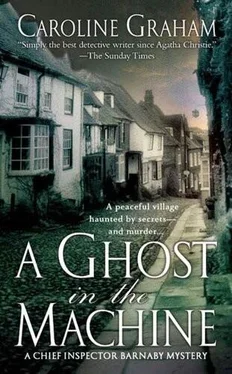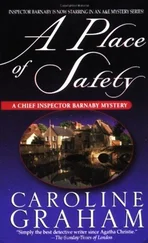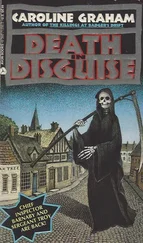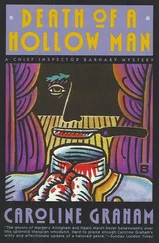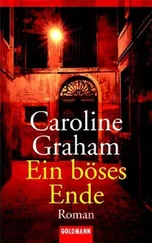Benny chattered happily on. She welcomed the opportunity. It was the evenings when she felt most lonely – daytime could be easily filled—and she was really enjoying herself. And one of the nicest things about the conversation was how interested Polly seemed to be in everything she had to say. It was really heart-warming.
Benny branched out a little, touching on Dennis. Had Polly seen his war machines? They were really amazing, though rather frightening too. Benny had only seen them once and nothing in the world would induce her to go into the room again. Then, sensing Polly’s interest waning, she began to describe various village worthies, all seemingly just as nice and kind and interesting as the Parnells.
Polly listened, hardly able to disguise her amazement. She had never heard a conversation like it. This woman seemed to think ill of absolutely no one. How could anyone remain so innocent in this day and age? And how on earth did she cope with life? You’d hardly trust her to post a letter.
Eventually dusk fell. Polly excused herself and went upstairs to use the phone in her great-aunt’s bedroom to dial her mobile. It worked a treat. Running back downstairs, rootling about in her rucksack on the kitchen table she talked excitedly to a friend who’d come especially down. The call concluded, Polly cut short Benny’s interested but slightly anxious questions, saying the first thing that came into her head.
“Someone I’m going on holiday with, Ben. To Crete, actually. They just want to sort out the final arrangements.”
Nearly all the buildings on Causton market square had been there since the nineteenth century and most from the eighteenth or even earlier. The local preservation society, which had strong moral if not financial support from British Heritage, was very hot on parity of historical detail. There had been several heated discussions when Fallon and Brinkley had applied to put up a simple brass plate next to the, by now, half-fake Tudor frontage of the Nat West Bank. It was gravely pointed out to Mr. Brinkley that the said offices were, in fact, over rather than adjacent to the bank and thus the plate would be rather misleading. Dennis, with admirable restraint, asked if his clients were supposed to leap twenty feet in the air to check that they had arrived at the correct address for their appointment. Despite such levity he had finally received permission, though it had been touch and go. Of course that had been years ago. Now the rot had well and truly set in.
One of the shops had been converted to a private dwelling and the new owners had painted the outside walls lime green. Furious, frothing correspondence ensued but the couple were adamant about cheering the old place up a bit. They were breaking no laws and were blithely indifferent to emotional blackmail along the lines of sceptred isles, thrones of kings and silver seas. When told by the rector’s wife that if they remained firm no one of any standing would speak to them, hysterical cackles followed her all way back to St. Hubert’s Close.
Then there had been Lovage and Cardoon, wide-ranging haberdashers, also selling fine linens and dusty-pink restraining garments to the middle classes since the 1950s. The remaining partner having finally retired, the business was taken over by a rather common cake shop. The new owners ripped out all the beautiful stained-oak fittings and narrow, glass-fronted drawers, put in cheap chairs with tartan seats and plastic tray attachments, then had the cheek to christen themselves Patisserie Française. An offence under the Trades Description Act, sniffed the preservation committee, the pastries being about as French as Colman’s Mustard, and the “ café crème ” indistinguishable from gravy browning.
But Mr. Allibone, the fresh fish and game merchant, was a shining jewel in this crown of struggling conservation. The facia of his lovely shop had been installed by his grandfather, Albert Allibone, in the 1930s and remained unimproved to the present day. Heavy black calligraphic script impressed on a background resembling crumpled silver paper described the business. In the front windows crabs and shining mackerel, mussels, orange-speckled dabs, fresh monkfish and undyed smoked haddock circled a huge turbot. All this lay on great slabs of ice garlanded with real seaweed. The game was kept in cold storage.
Dennis enjoyed a nice piece of fresh fish, and it was fresh at Allibones. Bright-eyed with sparkling scales and smelling of the sea. Rather pricey, but his customers never minded that. Were inclined to boast of it, in fact; make remarks along the lines of: “You’d be lucky to find quality like this at Tesco’s. Or service either.”
There was a queue, three women clutching old-fashioned wicker shopping baskets. Dennis patiently tacked himself on the end, exchanging greetings.
“So what’s your fancy today, Mr. Brinkley?” asked Brian Allibone, winking at nothing in particular and tipping back his boater. “A nice pair of herrings? Wing of skate?”
“To tell the truth – though I hate to spoil such perfection – I really fancy a bit of that turbot.”
“Then turbot it shall be, sir.”
The fishmonger heaved the huge creature off the slab, wiped his hands on his blue-and-white-striped apron and picked up a sharp knife. The saucily tipped straw hat, rosy cheeks and glossy black moustaches gave a first impression of jovial warmth and humour. But the twinkling eyes were cold and his nose was white with a pointy, pinched tip. All the better for poking into other people’s business, folk said. And they were not far wrong.
“Working late again the other night, Mr. Brinkley?”
“Late?” Dennis looked puzzled.
“Tuesday, I believe. I only took a casual glance but your little snake lamp was on well past midnight.”
Mr. and Mrs. Allibone lived above the shop that faced Dennis’s office across the cobbled square. It was rumoured that his casual glances were reinforced by a set of powerful field glasses kept on the sitting-room window seat for just that purpose.
“It couldn’t have been.” Dennis knew what Mr. Allibone meant by “again.” A couple of weeks ago he had been kind enough to point out a similar occurrence, though the hour was somewhat earlier. And once last week too.
Dennis had assumed a light left on and had made sure every evening after that to switch off before leaving. He had even written a little stick-on note, “Remember Switch,” and attached it to the outer doorframe.
“Oo-er,” shuddered Mr. Allibone, adding fresh parsley to the turbot and wrapping the lot in thick white paper. “Dirty work at the crossroads.”
Dennis watched the man’s nostrils flex and twitch, sniffing a mystery. All this was most distasteful.
“I’ve…er…got one of those time things,” he said, handing over a five-pound note and receiving a few pence in exchange. “Can’t be too careful these days.”
“Ah, that explains it.” Mr. Allibone put the parcel into a plastic carrier showing a plaice dancing on its tail. It wore a top hat and a bow tie and was twirling a cane. “Shan’t need to tell you next time it happens then?”
“That’s right,” said Dennis. What else could he say? He left the shop realising the momentary satisfaction gained from squashing Mr. Allibone’s prurient curiosity had been dearly bought. Now he had no way of finding out if the light was ever switched on again after the business was closed. Not unless he sat in his car night after night and watched on the off chance, which was plainly ridiculous.
Instead of getting into the car and driving home, Dennis put the fish in the boot and returned to his office. He walked over to the window and watched Mr. Allibone winding back his dark green awning in preparation for closing. Then he flung himself into the comfortable armchair facing his desk and prepared to think.
Читать дальше
